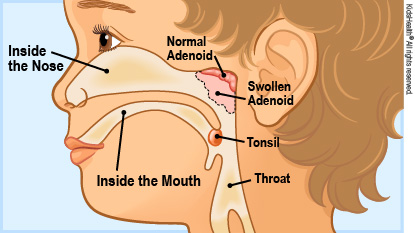Enlarged Adenoid Tissue: How to Care for Your Child
Enlarged adenoid tissue is common in kids. Health care providers may treat it if there are problems with infections, sleeping, or breathing.


Adenoid tissue is found in the back of the nasal cavity, above the roof of the mouth. It is part of the immune system, which helps protect kids from getting sick. As kids grow older, adenoid tissue shrinks and plays less of a role in fighting illness.
Enlarged adenoid tissue is common in young children. This can be an ongoing (chronic) condition or a temporary effect of fighting off an infection. Kids with enlarged adenoid tissue may snore, breathe through their mouth, have a stuffy or runny nose, have restless sleep, stop breathing for a few seconds during sleep, or talk as if the nose is pinched shut. A child with adenoid tissue that stays enlarged for a long time may be more likely to get repeated ear infections.
Enlarged adenoid tissue often shrinks on its own. But if it is infected or causing problems with breathing or sleeping, your health care provider may prescribe medicine or recommend surgery to remove the tissue (an adenoidectomy).
The health care provider asked questions, examined your child, and may have ordered an X-ray to help make the diagnosis of enlarged adenoid tissue.


-
Make sure your child follows up with the health care provider as recommended.
-
Make your home and car smoke-free since exposure to smoking can make infection and breathing problems more likely. If anyone in your family smokes, call 1-800-QUIT-NOW for advice on quitting.

Your child has new symptoms, such as:
-
Being very tired during the day or falling asleep during school.
-
Snoring, gasping sounds, or pauses in breathing while sleeping.
-
Poor performance in school.
-
Problems with friends.
-
Bedwetting.
-
Disruptive behavior.
-
Fever.
-
Ear pain.

-
Your child is short of breath.
-
Your child is breathing fast.
-
The skin between your child's ribs and neck pulls in tight during breathing.

Children who have adenoid tissue removed generally are not more likely to get infections than other kids. Other tissues in the body take over for the adenoid tissue to help prevent infection.